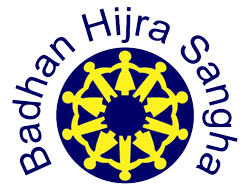There is growing evidence that indicates significant levels of Hijra who have sex with males in both urban and rural areas in Bangladesh as well as the existence of substantial levels of male commercial sex workers in urban areas. With this are the high level of sexual activity and multiple sexual partners by these males, significant levels of sexual access to females by many of them including their wives, low levels of condom use and safer sex practices, with the concomitant high risks for HIV and STI transmission from these males to their sexual partners. According to 4th round sero and behavior survey report, HIV prevalence rate among the Hijra’s is 0.8%.
The socio cultural, country legislation and religious value also put them more vulnerable. The issue of Hijra sexual behaviors and their impact upon the sexual health for Hijra has profound implications for a potential STD/HIV/AIDS epidemic in the country. Because of cultural, religious and social reasons these behaviors are to a large extend invisible, often difficult to access in terms of standard sexual health promotion frameworks.
The livelihood picture of the transgender (Hijra) peoples is vulnerable in the country. Their livelihood depends on the selling sex or someone collecting goods from the markets. Most of the transgender peoples have not access to others earning sources due to social, religious, cultural reasons.
The livelihood picture of the transgender (Hijra) peoples is vulnerable in the country. Their livelihood depends on the selling sex or someone collecting goods from the markets. Most of the transgender peoples have not access to others earning sources due to social, religious, cultural reasons.
At present HIV/AIDS is evolving as burning issue universally. Bangladesh is not beyond this situation. STI rate among Hijra is quite high. As the Hijra's are directly involved in sex work & they do the sex work in rectum. So they are most vulnerable & risky in spreading HIV/AIDS.
Hijra's are deprived from usual /general/conventional hospital providing health services & they are not much interested to take services from hospital. Besides this they have no interest about health awareness and safer sex practice/behavior. For the above mentioned reasons it is very essential to implement the long term STD, HIV/AIDS prevention & control program among Hijra Community.
Risk of HIV infection
- Marginalized group
- Multiple sex partners
- Sex with males, Female
- Anal sex practice
- They have female partner
- STI rate high
- Low condom used rate
Family Problem
- They have to detach from family due to different type of behavior (feminizing)/ become Transgender (Hijra)
- Deprived from assets & properties (From Parents)
- Others member of the family behave roughly
- In some cases, even family of transgender have to single from society due to born TG child in the family
Social Problem
- Transgender people cannot move freely in the society like others
- They cannot sit on the vehicle with others ( Male /Female)
- They cannot live in the society with dignity ( everybody neglect them)
- Classmates cannot mix with Transgender students. The classmates criticize , tease & neglect. As a result, they dropout from school life earlier
- No access in religious festival or worship
- Barrier / Obstacle in social activities
- Constraint in employment and no opportunity
- Even they are terminated from job if disclose the identity
- Deprived from medical treatment/service
- House owner did not give them house rent
- Not even get proper Job opportunity
- Harassment from muscleman/ police & other people
- Deprived from justice ( there is no article in the constitution of Bangladesh about Transgender people)
- They are deprived from right of votes as nothing statement in the constitution about Transgender
Health Related Constraint
- The probability of contamination of STI, sexual disease including HIV /AIDS is very much high among Transgender people due to risky behavior
- No male nor female doctor did not interest to serve the Transgender people
- If any Transgender people come to Doctor with STI syndrome , Doctor grew into fire when informed about case of anal sex
- Lack of appropriate sexual health
- Can’t access mainstream sexual health service
- Mental & homophobia make Sometimes suicide tendency among Transgender (Hijra).
Exclusion
Economic aspects of exclusion:
Economic aspects of exclusion include barriers to employment opportunities, constrained access to commodities, and livelihood opportunities, such as income, housing, land, and working conditionsSocial aspects of exclusion:
Social aspects of exclusion refer to limited or no access to social, educational, legal and health services, resulting from ruptured social protection and social cohesion, such as kinship, family, neighbourhood, and the community
Cultural aspects of exclusion:
Cultural aspects of exclusion refer to subordination of certain norms, behaviours, cultural practices, and lifestyles which exclude certain individuals or groups.
Political aspects of exclusion:
Political aspects of exclusion refer to deprivations of citizens’ rights, including restricted access to organizations, voter rights, legislations, constitutions, and decision-making in policy
Gender aspect of exclusion:
Gendered exclusion was only considered in the case of women in various settings but in Bangladesh, transgender are not considered as gender though recently Bangladesh govt. declared the transgender people (Hijra) as third gender but not yet gazetted.
